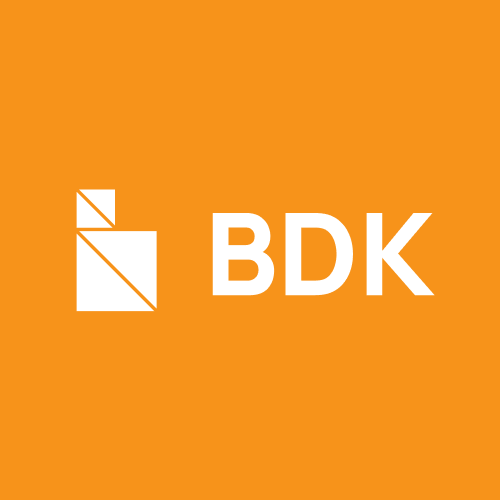We would previously push 108 bytes on a P2WPKH witness to simulate signature + pubkey. This was wrong: we should push 106 bytes instead. The max satisfaction size for a P2WPKH is 112 WU: elements in witness (1 byte, 1WU) + OP_PUSH (1 byte, 1WU) + pk (33 bytes, 33 WU) + OP_PUSH (1 byte, 1WU) + signature and sighash (72 bytes, 72 WU) + scriptsig len (1 byte, 4WU) We should push on the witness pk + signature and sighash. This is 105 WU. Since we push just once instead of twice, we add 1WU for the OP_PUSH we are omitting.
BDK

A modern, lightweight, descriptor-based wallet library written in Rust!
Project Homepage | Documentation
About
The bdk library aims to be the core building block for Bitcoin wallets of any kind.
- It uses Miniscript to support descriptors with generalized conditions. This exact same library can be used to build single-sig wallets, multisigs, timelocked contracts and more.
- It supports multiple blockchain backends and databases, allowing developers to choose exactly what's right for their projects.
- It's built to be cross-platform: the core logic works on desktop, mobile, and even WebAssembly.
- It's very easy to extend: developers can implement customized logic for blockchain backends, databases, signers, coin selection, and more, without having to fork and modify this library.
Examples
Sync the balance of a descriptor
use bdk::Wallet;
use bdk::database::MemoryDatabase;
use bdk::blockchain::ElectrumBlockchain;
use bdk::SyncOptions;
use bdk::electrum_client::Client;
use bdk::bitcoin::Network;
fn main() -> Result<(), bdk::Error> {
let blockchain = ElectrumBlockchain::from(Client::new("ssl://electrum.blockstream.info:60002")?);
let wallet = Wallet::new(
"wpkh([c258d2e4/84h/1h/0h]tpubDDYkZojQFQjht8Tm4jsS3iuEmKjTiEGjG6KnuFNKKJb5A6ZUCUZKdvLdSDWofKi4ToRCwb9poe1XdqfUnP4jaJjCB2Zwv11ZLgSbnZSNecE/0/*)",
Some("wpkh([c258d2e4/84h/1h/0h]tpubDDYkZojQFQjht8Tm4jsS3iuEmKjTiEGjG6KnuFNKKJb5A6ZUCUZKdvLdSDWofKi4ToRCwb9poe1XdqfUnP4jaJjCB2Zwv11ZLgSbnZSNecE/1/*)"),
Network::Testnet,
MemoryDatabase::default(),
)?;
wallet.sync(&blockchain, SyncOptions::default())?;
println!("Descriptor balance: {} SAT", wallet.get_balance()?);
Ok(())
}
Generate a few addresses
use bdk::{Wallet, database::MemoryDatabase};
use bdk::wallet::AddressIndex::New;
fn main() -> Result<(), bdk::Error> {
let wallet = Wallet::new(
"wpkh([c258d2e4/84h/1h/0h]tpubDDYkZojQFQjht8Tm4jsS3iuEmKjTiEGjG6KnuFNKKJb5A6ZUCUZKdvLdSDWofKi4ToRCwb9poe1XdqfUnP4jaJjCB2Zwv11ZLgSbnZSNecE/0/*)",
Some("wpkh([c258d2e4/84h/1h/0h]tpubDDYkZojQFQjht8Tm4jsS3iuEmKjTiEGjG6KnuFNKKJb5A6ZUCUZKdvLdSDWofKi4ToRCwb9poe1XdqfUnP4jaJjCB2Zwv11ZLgSbnZSNecE/1/*)"),
bitcoin::Network::Testnet,
MemoryDatabase::default(),
)?;
println!("Address #0: {}", wallet.get_address(New)?);
println!("Address #1: {}", wallet.get_address(New)?);
println!("Address #2: {}", wallet.get_address(New)?);
Ok(())
}
Create a transaction
use bdk::{FeeRate, Wallet, SyncOptions};
use bdk::database::MemoryDatabase;
use bdk::blockchain::ElectrumBlockchain;
use bdk::electrum_client::Client;
use bdk::wallet::AddressIndex::New;
use bitcoin::base64;
use bitcoin::consensus::serialize;
fn main() -> Result<(), bdk::Error> {
let blockchain = ElectrumBlockchain::from(Client::new("ssl://electrum.blockstream.info:60002")?);
let wallet = Wallet::new(
"wpkh([c258d2e4/84h/1h/0h]tpubDDYkZojQFQjht8Tm4jsS3iuEmKjTiEGjG6KnuFNKKJb5A6ZUCUZKdvLdSDWofKi4ToRCwb9poe1XdqfUnP4jaJjCB2Zwv11ZLgSbnZSNecE/0/*)",
Some("wpkh([c258d2e4/84h/1h/0h]tpubDDYkZojQFQjht8Tm4jsS3iuEmKjTiEGjG6KnuFNKKJb5A6ZUCUZKdvLdSDWofKi4ToRCwb9poe1XdqfUnP4jaJjCB2Zwv11ZLgSbnZSNecE/1/*)"),
bitcoin::Network::Testnet,
MemoryDatabase::default(),
)?;
wallet.sync(&blockchain, SyncOptions::default())?;
let send_to = wallet.get_address(New)?;
let (psbt, details) = {
let mut builder = wallet.build_tx();
builder
.add_recipient(send_to.script_pubkey(), 50_000)
.enable_rbf()
.do_not_spend_change()
.fee_rate(FeeRate::from_sat_per_vb(5.0));
builder.finish()?
};
println!("Transaction details: {:#?}", details);
println!("Unsigned PSBT: {}", base64::encode(&serialize(&psbt)));
Ok(())
}
Sign a transaction
use bdk::{Wallet, SignOptions, database::MemoryDatabase};
use bitcoin::base64;
use bitcoin::consensus::deserialize;
fn main() -> Result<(), bdk::Error> {
let wallet = Wallet::new(
"wpkh([c258d2e4/84h/1h/0h]tprv8griRPhA7342zfRyB6CqeKF8CJDXYu5pgnj1cjL1u2ngKcJha5jjTRimG82ABzJQ4MQe71CV54xfn25BbhCNfEGGJZnxvCDQCd6JkbvxW6h/0/*)",
Some("wpkh([c258d2e4/84h/1h/0h]tprv8griRPhA7342zfRyB6CqeKF8CJDXYu5pgnj1cjL1u2ngKcJha5jjTRimG82ABzJQ4MQe71CV54xfn25BbhCNfEGGJZnxvCDQCd6JkbvxW6h/1/*)"),
bitcoin::Network::Testnet,
MemoryDatabase::default(),
)?;
let psbt = "...";
let mut psbt = deserialize(&base64::decode(psbt).unwrap())?;
let finalized = wallet.sign(&mut psbt, SignOptions::default())?;
Ok(())
}
Testing
Unit testing
cargo test
Integration testing
Integration testing require testing features, for example:
cargo test --features test-electrum
The other options are test-esplora, test-rpc or test-rpc-legacy which runs against an older version of Bitcoin Core.
Note that electrs and bitcoind binaries are automatically downloaded (on mac and linux), to specify you already have installed binaries you must use --no-default-features and provide BITCOIND_EXE and ELECTRS_EXE as environment variables.
License
Licensed under either of
- Apache License, Version 2.0 (LICENSE-APACHE or http://www.apache.org/licenses/LICENSE-2.0)
- MIT license (LICENSE-MIT or http://opensource.org/licenses/MIT)
at your option.
Contribution
Unless you explicitly state otherwise, any contribution intentionally submitted for inclusion in the work by you, as defined in the Apache-2.0 license, shall be dual licensed as above, without any additional terms or conditions.




